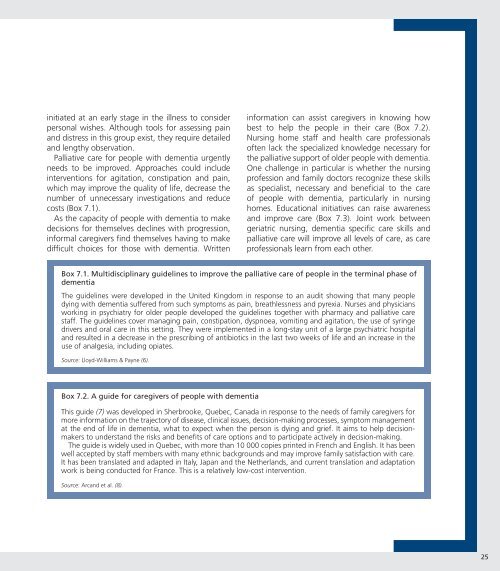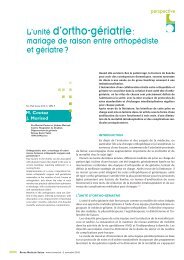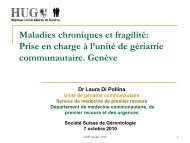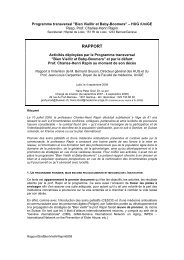Palliative care for older people - World Health Organization ...
Palliative care for older people - World Health Organization ...
Palliative care for older people - World Health Organization ...
Create successful ePaper yourself
Turn your PDF publications into a flip-book with our unique Google optimized e-Paper software.
initiated at an early stage in the illness to considerpersonal wishes. Although tools <strong>for</strong> assessing painand distress in this group exist, they require detailedand lengthy observation.<strong>Palliative</strong> <strong>care</strong> <strong>for</strong> <strong>people</strong> with dementia urgentlyneeds to be improved. Approaches could includeinterventions <strong>for</strong> agitation, constipation and pain,which may improve the quality of life, decrease thenumber of unnecessary investigations and reducecosts (Box 7.1).As the capacity of <strong>people</strong> with dementia to makedecisions <strong>for</strong> themselves declines with progression,in<strong>for</strong>mal <strong>care</strong>givers find themselves having to makedifficult choices <strong>for</strong> those with dementia. Writtenin<strong>for</strong>mation can assist <strong>care</strong>givers in knowing howbest to help the <strong>people</strong> in their <strong>care</strong> (Box 7.2).Nursing home staff and health <strong>care</strong> professionalsoften lack the specialized knowledge necessary <strong>for</strong>the palliative support of <strong>older</strong> <strong>people</strong> with dementia.One challenge in particular is whether the nursingprofession and family doctors recognize these skillsas specialist, necessary and beneficial to the <strong>care</strong>of <strong>people</strong> with dementia, particularly in nursinghomes. Educational initiatives can raise awarenessand improve <strong>care</strong> (Box 7.3). Joint work betweengeriatric nursing, dementia specific <strong>care</strong> skills andpalliative <strong>care</strong> will improve all levels of <strong>care</strong>, as <strong>care</strong>professionals learn from each other.Box 7.1. Multidisciplinary guidelines to improve the palliative <strong>care</strong> of <strong>people</strong> in the terminal phase ofdementiaThe guidelines were developed in the United Kingdom in response to an audit showing that many <strong>people</strong>dying with dementia suffered from such symptoms as pain, breathlessness and pyrexia. Nurses and physiciansworking in psychiatry <strong>for</strong> <strong>older</strong> <strong>people</strong> developed the guidelines together with pharmacy and palliative <strong>care</strong>staff. The guidelines cover managing pain, constipation, dyspnoea, vomiting and agitation, the use of syringedrivers and oral <strong>care</strong> in this setting. They were implemented in a long-stay unit of a large psychiatric hospitaland resulted in a decrease in the prescribing of antibiotics in the last two weeks of life and an increase in theuse of analgesia, including opiates.Source: Lloyd-Williams & Payne (6).Box 7.2. A guide <strong>for</strong> <strong>care</strong>givers of <strong>people</strong> with dementiaThis guide (7) was developed in Sherbrooke, Quebec, Canada in response to the needs of family <strong>care</strong>givers <strong>for</strong>more in<strong>for</strong>mation on the trajectory of disease, clinical issues, decision-making processes, symptom managementat the end of life in dementia, what to expect when the person is dying and grief. It aims to help decisionmakersto understand the risks and benefits of <strong>care</strong> options and to participate actively in decision-making.The guide is widely used in Quebec, with more than 10 000 copies printed in French and English. It has beenwell accepted by staff members with many ethnic backgrounds and may improve family satisfaction with <strong>care</strong>.It has been translated and adapted in Italy, Japan and the Netherlands, and current translation and adaptationwork is being conducted <strong>for</strong> France. This is a relatively low-cost intervention.Source: Arcand et al. (8).25
















